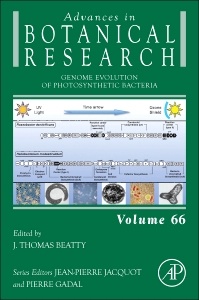Description
Genome Evolution of Photosynthetic Bacteria
Author: Beatty Tom J.
Language: English
Subjects for Genome Evolution of Photosynthetic Bacteria:
Keywords
(Re)-Citrate synthase; Aerobic Anoxygenic Phototrophic Bacteria; Aerobic Anoxygenic Phototrophs; Aerobic anoxygenic phototrophs; Anaerobic anoxygenic phototrophic bacteria; Anoxygenic photosynthesis; Bacteria; Bacteriochlorophyll; BchB; BchL; BchN; BchX; Cell wall biosynthesis; Chlorobi; Chloroflexi taxonomy; Chlorophyll; Clade C Cyanobacteria; Conserved signature indels; Cryptic plasmids; Endogenous plasmids; Gene Clusters; Gene expression; Genes; Genome sequencing; Genomes; Genomic Analyses; Green Bacterial Evolution; Heavy metal resistance; Heliobacteria; Heliobacteriaceae; Horizontal gene transfer; Iron homeostasis; Iron-sulfur cluster; Lateral gene transfers; Light; Light-harvesting complexes; Light-signalling; Microarray; Neoproterozoic; NifH; Nitrogen oxide reduction; O2; Organisms; Oxidative tricarboxylic acid cycle; Phenotypes; Photoheterotrophy; Photosynthesis; Photosynthesis Gene Clusters; Photosynthesis Genes; Photosynthesis gene cluster; Phototrophy; Phylogeny; Phytochrome domains; Phytochromes; Plasmid evolution; Plasmid replication; Proteobacteria; Purple Bacteria; Purple Photosynthetic Bacterial System; Purple bacteria; Reaction centre; Reductive tricarboxylic acid cycle; Regressive evolution; Regulation; Regulon; Response regulators; Rhodobacter genus; Signature proteins; Transcriptomics; Type-I photosystem; bacteria; mRNA
448 p. · 15x22.8 cm · Hardback
Description
/li>Contents
/li>Readership
/li>Comment
/li>
Advances in Botanical Research publishes in-depth and up-to-date reviews on a wide range of topics in plant sciences. The series features a wide range of reviews by recognized experts on all aspects of plant genetics, biochemistry, cell biology, molecular biology, physiology and ecology. This thematic volume features reviews on genome evolution of photosynthetic bacteria.
- Genome evolution of photosynthetic bacteria
- Molecular markers for Photosynthetic Bacteria and Insights Provided by them into the Origin of Photosynthesis
- Properties and evolutionary implications of the heliobacterial genome
- The phylum Chlorobi
- Evolution of photosynthesis suspected from genome comparisons in purple bacteria
- The Living Genome of a Purple Nonsulfur Photosynthetic Bacterium: Overview of the Rhodobacter sphaeroides Transcriptome
- Evolution of light-harvesting genes in the purple bacteria
- The role and evolution of endogenous plasmids in photosynthetic bacteria
- Evolution of bacteriophytochrome function in bacteria
- Iron homeostasis features in purple non-sulfur bacteria
- Aerobic anoxygenic phototrophs
- Evolution of marine aerobic anoxygenic phototrophic bacteria as seen from their diverse arrangements of photosynthesis gene clusters
- Regressive evolution of photosynthesis in marine Roseobacters
- Publishes in-depth and up-to-date reviews on a wide range of topics in plant sciences
- Features a wide range of reviews by recognized experts on all aspects of plant genetics, biochemistry, cell biology, molecular biology, physiology and ecology
- This thematic volume features reviews on genome evolution of photosynthetic bacteria
These books may interest you

Genomics of Cyanobacteria 182.55 €

Genomes of Herbaceous Land Plants 182.55 €


